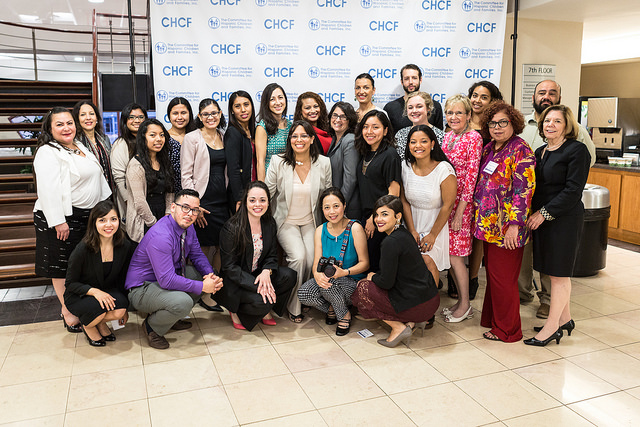The Committee for Hispanic Children and Families (CHCF) released it’s white paper, Unleashing the Economic Power of Family Child Care Providers, to a diverse audience of elected officials, policy makers, city agency representatives, private sector and other non-profit sector participants.
Family child care providers offer a vital service that too often is undervalued. Often times providers also fail to recognize their role in educating our youngest citizens and as part of the safety net that allows parents to provide for their families. While they are referred to as “baby-sitters” they are much more than that. They are: caregivers, chefs/nutritionists, housekeepers, child development specialists, educators, health care providers, emergency management personnel, social workers, business managers, and entrepreneurs.
FCC providers offer a vital service that affords parents the opportunity to participate in the labor force and contribute to the economy directly via the creation of employment opportunities and consumption. Yet many providers find themselves at the lower end of the economic spectrum. The primary reason early care and education programs fail is financial management.
The sector in New York City is dominated by women, many of whom are immigrants from Latin America. Generally, the impetus for entry into child care has been motivated by the high cost of child care and/or the desire to care for their children. They encounter a complex web of regulations that at times are inconsistent with each other. These regulations can create volatility in income and cash flow, a situation that is exacerbated by providers’ lack of financial acumen. Financial education and other professional development is strongly desired, yet time constraints present a challenge for delivery. Despite the hurdles, they are using their own drive and efforts to sustain their households, send their children to college, purchase homes and/or other financial goals. The recommendations presented were: offer financial education in various languages and modalities, conduct and facilitate advocacy, develop private-public-nonprofit partnerships, explore facilitating workshops in auxiliary subjects (English, computer skills), and make available an information clearinghouse.
While American families have invariably needed to address child care throughout time, it nonetheless has been deemed a personal matter versus a public matter. However, the First Lady of New York City Chirlane McCray, a key contributor in the Administration’s successful efforts to establish universal pre-kindergarten, a partner with Too Small to Fail on the issue of early childhood literacy, and a leader in the WE NYC initiative remarked that the science supports the crucial impact early childhood educators have on the brain development of children ages of zero to five. In NYC, thousands of children between those ages are cared for by family child care providers – thereby playing an integral role in establishing NYC children’s developmental foundation.
The well-being of these providers and the viability and sustainability of their programs directly impact the quality and availability of child care in NYC.
We wish to thank Citi, Eileen Auld and Frances Liu.

